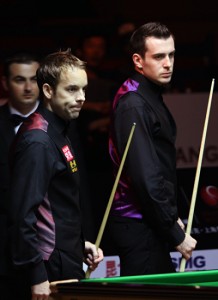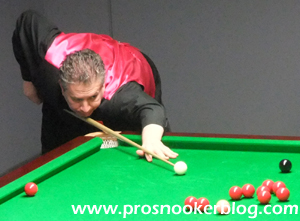
Congratulations to Ding Junhui and Liang Wenbo who have today defeated Northern Irish duo Mark Allen and Gerard Greene 4-2 to win the revived World Cup tournament for China. Click below for more on that as well as my tournament reflections…
Coming into the match as slight favourites, China got off to the perfect start as Ding notched breaks of 37 and 84 to defeat Mark Allen before Liang doubled the lead in no time at all.
The first doubles frame was to prove much closer as both teams had chances, but a missed final red down the bottom cushion from Mark proved to be the key shot as China recovered to secure a 3-0 lead and leave themselves needing just one more for the title.
Pitted against Ding in the first of the reverse single,s Gerard Greene was under real pressure but with the aid of a couple of brave shots, a determined break of 109 was enough to keep his team in the match at 3-1.
The killing thrust however looked like it would be applied in the fifth frame as Liang moved 55 points ahead before he was faced with the choice of taking on either a blue or a difficult pink which would inevitably bring more reds into play. After some deliberation Liang elected to take on the pink but unfortunately for China was unsuccessful, not only missing it but also spreading the reds for a grateful Mark Allen.

Liang’s position on the pink (courtesy of Snooker Island)
With the pressure now back on China at 3-2 we had our second doubles frame of the match and the early chance fell to Northern Ireland as Greene eyed up a red to the left-centre. Surprisingly however he was to miss that shot, in no small part due to the discussions that took place with team-mate Mark Allen prior to taking the shot and it proved to be their last of the match as China wrapped up victory with a well-taken 89.
A fine achievement for China, following Ding Junhui’s success at the Masters back in January it is further confirmation if any was needed that China are now very much a force in professional snooker. Well done to Northern Ireland too though, it was a fine win that they had against Scotland yesterday and they made it through to the final on merit. Had they been a bit sharper in the doubles frames today then it could have been very different.
Aside from the final, I thought that I would take this opportunity to reflect on the World Cup as a whole and in short I would say it has been ok, but there is room for improvement.
What worked well? It was good to see team snooker on our screens again and it was good to see a number of the amateurs give a good account of themselves and take the event seriously. It was interesting to see how the doubles worked, particularly with the alternate shot format as opposed to the more traditional alternate visit. There was a lot of scepticism ahead of the opening morning as it became clear that the matches would be played this way, but I would say that the reaction at worst seems to have been mixed, if not overwhelmingly positive either.

From what I have seen a lot of the doubles matches were slow going, though I am not sure whether this was down to the alternate shot format or simply because of the pressure involved in such short format matches, not to mention the experience of some of the players involved. I have probably not seen enough of the tournament to come down and say either way. What has been noticeable I think is that the teams who have spent the most time discussing their shots have probably ran into more difficulty than those who have got down and just played the shots, namely China.
The other talking point from the tournament is that to the TV viewer at least, the venue has come across as being somewhat lifeless. Certainly as I have watched an hour or so of the afternoon matches before heading out to work there appear to have been very few spectators present indeed which has no doubt led to the criticism.
That said however, Graeme who as you may have seen yesterday was in attendance at the event has said that the numbers were greater than it might have appeared and others choosing between matches on the Eurosport Player have noted that the crowds were often bigger away from the TV tables where for example Thai teams may have been playing.
All in all then, perhaps it was not as clear cut as it might have appeared, though irrespective of the actual size of the crowds, the event did not come across that well on TV.

Another issue is that of the format which saw five days of group matches involving 20 teams which in comparison to the knock-out rounds I think went on a little too long. Understandably they probably wanted to guarantee that each of the teams was able to have a good amount of matches over there but perhaps fewer teams, perhaps four groups of six would work a little better. Alternatively there is an argument for three man teams with longer matches which might also help to add a little variety to the group phases.
There is also the way that the groups were decided, eg on frames won as opposed to a system which awarded bonus points for match wins. On the one hand this helped to sustain interest in what otherwise would have been ‘dead’ frames, but on the other it inevitably took the edge off what would otherwise have been deciding frames. It does seem perverse that winless Belgium were able to finish above a Brazil team which had actually beaten them in their head to head match!
A final tweak that I would like to see made is for the teams to wear team colours rather than their usual personal waistcoats. A minor point perhaps but I think that it would help to give the tournament a sense of identity as it had in the 1990’s.
Still, it was good to see the event back on the calendar and hopefully lessons will have been learned for the future. After all, the tournament has to be staged in order to see what worked and what does not.
On to Australia!
